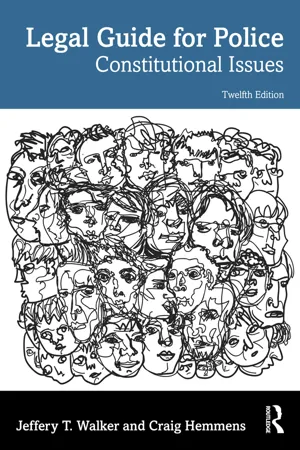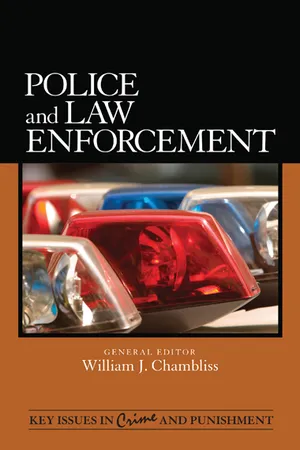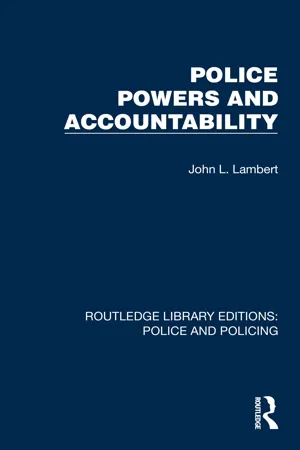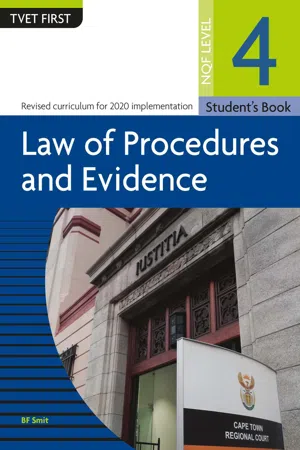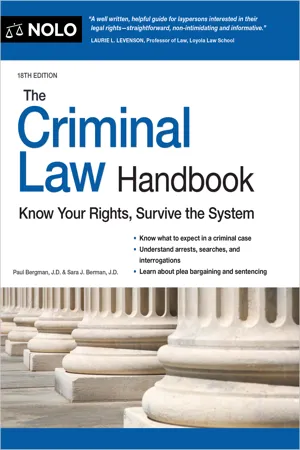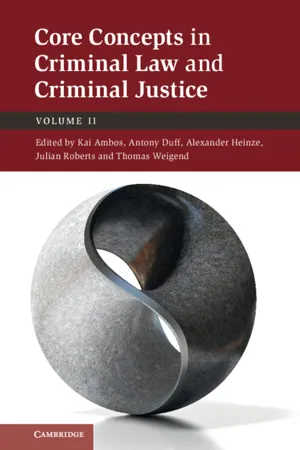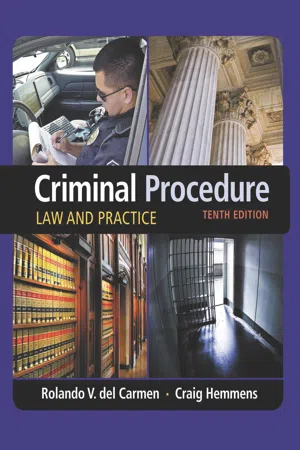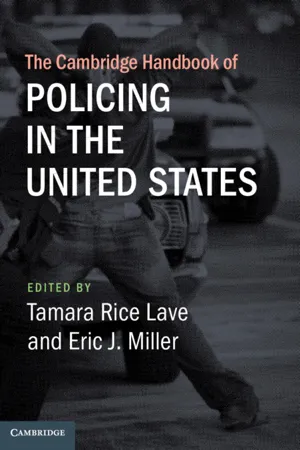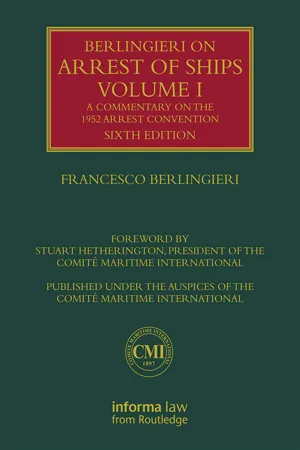Law
Arrests
Arrests refer to the legal process of taking an individual into custody by law enforcement authorities. This action is typically carried out when there is probable cause to believe that the person has committed a crime. Arrests are a fundamental aspect of law enforcement and are governed by specific legal procedures to protect the rights of the individual being arrested.
Written by Perlego with AI-assistance
Related key terms
1 of 5
10 Key excerpts on "Arrests"
- eBook - ePub
Legal Guide for Police
Constitutional Issues
- Jeffery T. Walker, Craig Hemmens(Authors)
- 2023(Publication Date)
- Routledge(Publisher)
arrest. For this reason, it is necessary to look to court decisions, treatises, and encyclopedias for definitions. Some of the more common definitions include the following:- The term “arrest” has a technical meaning, applicable in legal proceedings. It implies that a person is thereby restrained of his liberty by some officer or agency of the law, armed with lawful process, authorizing and requiring the arrest to be made. It is intended to serve, and does serve, the end of bringing the person arrested personally within the custody and control of the law, for the purpose specified in, or contemplated by the process.9
- An arrest is the taking, seizing, or detaining of the person of another, (1) by touching or putting hands on him; or (2) by any act that indicates an intention to take him into custody and that subjects him to the actual control and will of the person making the arrest; or (3) by the consent of the person to be arrested.10
- An arrest of a person carries with it an element of detention, custody, or control of the accused, and the mere fact that an officer makes the statement to an accused that he is under arrest does not complete that arrest; there must be custody or detention and submission to such arrest.11
- A person is under “arrest” if he is not free to leave and a reasonable person in his position would not think that the detention was temporary.12
None of these definitions is entirely satisfactory. Arrest is a term that eludes precise definition. It is a legal conclusion used to describe a complex series of events that has taken place.In a 1989 civil rights case, the U.S. Supreme Court was called on to determine when a Fourth Amendment “seizure” occurs.13 In Brower v. County of Inyo, a civil rights action was brought, alleging that police officers, acting under color of state law, violated the rights of a driver who was killed when the stolen vehicle that he was driving at high speed to elude police crashed into a police roadblock. The complaint alleged that the “seizure” occurred when the driver of the car was stopped by an 18-wheel truck that was placed completely across the highway in the path of the driver. The district court dismissed the case against the police and the county, concluding that the roadblock was reasonable under the circumstances, and the court of appeals affirmed on the ground that no “seizure” had occurred.14 - eBook - PDF
- William J. Chambliss(Author)
- 2011(Publication Date)
- SAGE Publications, Inc(Publisher)
15 Arrest Practices Michael D. Lyman Columbia College 2 O f the many duties performed by police officers, the arrest of sus-pects remains at the core. The word arrest is a derivative of the French word arreter, which means “to stop or stay” and signifies the restraint of a person. In a literal sense, the word arrest means the appre-hension or restraint of a person, or the deprivation of one’s personal liberty. The question of whether or not a person is under arrest depends not on the legality of the arrest, but on whether the subject of the arrest has been deprived of his or her personal liberty to leave. Typically, Arrests are associated with taking someone into custody by a government official empowered by law to do so, for the purpose of holding or detaining him to answer a criminal charge, or to prevent the commission of a criminal offense. An arrest is the action by which a person is stopped from their normal activities by virtue of a legal authority or sanction, either by detaining them or stopping their ability to leave. For all intents and pur-poses, when a person is under arrest, they are deprived of their freedom. The Probable Cause Requirement An arrest represents a seizure by law enforcement of a person; as such, prob-able cause must first exist to justify the arrest. This is a legal distinction, but one made in the field by police and law enforcement officers every day. 16 Police and Law Enforcement Probable cause can be a difficult principle to establish. There are several general factors that should be taken into account when establishing prob-able cause. Observations Made by the Officer One of the most straightforward applications of probable cause is when the arresting officer personally observes actions, behaviors, or evidence that would cause the officer to believe that a crime has been or is being commit-ted. - eBook - ePub
- John L. Lambert(Author)
- 2023(Publication Date)
- Routledge(Publisher)
As a statement of classic constitutional theory that view cannot be faulted; but it is cold comfort to the man who has been unlawfully detained or whose person or property has been unlawfully searched. A more realistic view was taken by the Criminal Law Revision Committee, when in its Seventh Report it said:Ideally, the law should define clearly the rights of the police and private persons in all the situations that might confront them.2More recently, the Royal Commission on Criminal Procedure recognised that “there is a critically important relationship between the police and the public in the detection and investigation of crime”3 and suggested that public confidence in police powers required that these conform to three principal standards: fairness, openness and workability.4 The Royal Commission recommended far reaching changes to the law and central to its proposals was the notion that the major and most frequently used powers should be collected together in one statute or code. Powers to arrest and detain suspects lie at the heart of the law enforcement process. Their content and, as importantly, the way they are used, are crucial to the relationship between police and public.Arrest
The purpose of arrest is to render a person who has committed an offence or is reasonably suspected of so doing amenable to the criminal process. In many cases, of course, it is not necessary to arrest a person in order to ensure his presence before a court: the summons procedure is a very extensively used alternative. Around a quarter of those proceeded against for summary offences will have been brought to court by summons. Because arrest deprives a person of his liberty, its use traditionally has been restricted to offences which carry the penalty of imprisonment. Arrest can be made with or without warrant, though arrest on the authority of a warrant is relatively unusual.5 The law contains very extensive powers of arrest without warrant.By arrest an individual is deprived of his liberty. It was laid down in Bird v Jones6 that there is no arrest unless the restraint is total and it was this requirement that led to the view put forward in some of the older authorities that an arrest is not complete unless there is an actual seizing or touching of the arrested person. The court in Bird v Jones itself recognised, however, that the pronouncing of words of arrest followed by acquiescence in the arrest by the suspect would constitute a valid arrest.7 The modern view is best seen in the case of Alderson v Booth - eBook - PDF
Law of Procedures & Evidence NQF4 SB
TVET FIRST
- BF Smit(Author)
- 2019(Publication Date)
- Macmillan(Publisher)
(3) The effect of an arrest shall be that the person arrested shall be in lawful custody and that he shall be detained in custody until he is lawfully discharged or released from custody. For an arrest to be lawful, the following two requirements must be met: l If the person being arrested (the arrestee) does not submit or give in to the arrest, it is essential that the arrestor touch or confine the arrestee’s body. l The person effecting or carrying out the arrest (the arrestor) must, at the time of making the arrest or immediately thereafter, inform the arrested person of the reason for the arrest. If the arrest is made as a result of a warrant, the arrestor must hand the arrestee a copy of the warrant if the arrestee demands this. plaintiff: a person or institution that brings a civil claim against another in a court of law defendant: a person or institution sued by another in a court of law in a civil claim appellant: a person or institution that applies to a higher court for a reversal of the decision of a lower court respondent: a person against whom an appeal is lodged in a higher court balance of probabilities: the standard of proof in a civil trial; such standard is less onerous than the criminal law standard of beyond reasonable doubt New words 35 Module 3 Example 3.3: From our case law on arrest Case 1 : Brand v Minister of Justice and another [1959] 4 All SA 420 (A) states that what is required in the case of an arrest is that the arrested person should essentially be informed why his or her liberty is being restricted. Case 2: In R v Mazema 1948 (2) SA 154 (E ) , it was held that a person is under arrest as soon as the police assume control over his movements. Figure 3.2: Application for a warrant of arrest (J50) 36 Topic 3 Figure 3.3 (a): Subpoena in criminal proceedings – page 1 (J32) 37 Module 3 Figure 3.3 (b): Subpoena in criminal proceedings – page 2 (J32) 38 Topic 3 Figure 3.4 (a): Summons in a criminal case – page 1 (J175) - eBook - PDF
Criminal Law Handbook, The
Know Your Rights, Survive the System
- Paul Bergman, Sara J. Berman(Authors)
- 2024(Publication Date)
- NOLO(Publisher)
• Any contraband or evidence of a crime may be seized for later use in court. • An arrested person who remains in jail after the arrest will be taken before a judge as quickly as practi- cable for a hearing typically called an “arraignment” or “initial appearance.” General Arrest Principles This section describes the basic legal principles governing Arrests. 84 | THE CRIMINAL LAW HANDBOOK: KNOW YOUR RIGHTS, SURVIVE THE SYSTEM When exactly is a person under arrest? An arrest occurs when a police officer “seizes” an individual. For Fourth Amend- ment purposes, the seizure occurs when an officer applies physical force to a person with the intent to restrain the person (such as handcuffing or tasering), even if the officer is unsuccessful and the person gets away. A person may be “seized” and arrested even if the person isn’t taken into custody or taken to jail. The following situations illustrate the scope of an arrest: • Police officers with an arrest warrant approach a suspect, who jumps into a car. As the suspect drives off, one of the officers shoots and injures the suspect. The suspect has been “seized” even though she drove away. (Torres v. Madrid, U.S. Sup. Ct. 2021.) • A driver is stopped for a routine traffic violation. The driver might technically be considered under arrest because the driver isn’t free to leave until the officer has written a ticket (or if it’s the driver’s lucky day, only issued a warning). But the arrest is temporary. Assuming the officer has no basis to suspect that the driver is engaged in criminal activity other than the traffic violation, the officer usually releases the driver once the driver produces identification and signs a promise to appear in court (assuming a ticket was written). Traffic stop Arrests don’t become part of a person’s arrest record, and don’t count as Arrests for the purpose of answering the question, “Have you ever been arrested?” (on a job or license application, for example). - No longer available |Learn more
- (Author)
- 2014(Publication Date)
- University Publications(Publisher)
________________________ WORLD TECHNOLOGIES ________________________ Chapter 2 Citizen's Arrest A citizen's arrest is an arrest made by a person who is not acting as a sworn law-enforcement official. In common law jurisdictions, the practice dates back to medieval Britain and the English common law, in which sheriffs encouraged ordinary citizens to help apprehend law breakers. Despite the practice's name, in most countries, the arresting person is usually designated as a person with arrest powers, who need not be a citizen of the jurisdiction or country in which he or she is acting. For example, in England/Wales, the power comes from Section 24a Police and Criminal Evidence Act 1984, called 'any person arrest'. This legislation states 'any person' has these powers, and does not state that they need to be a citizen of England/Wales. Legal and political aspect A person who makes a citizen's arrest could risk exposing him or herself to possible lawsuits or criminal charges (such as charges of impersonating police, false im-prisonment, kidnapping, or wrongful arrest) if the wrong person is apprehended or a suspect's civil rights are violated. This is especially so when police forces are attempting to determine who an aggressor is. The level of responsibility that a person performing a citizen's arrest may bear depends on the jurisdiction. For instance, in France and Germany, a person stopping a criminal from committing a crime, including crimes against belongings, is not criminally responsible as long as the means employed are in proportion to the threat (note, however, that at least in Germany, this results from a different legal norm: self stupidness and aid to others in immediate danger, which are concerned with prevention, not prosecution, of crimes). Laws by country Australia The power to arrest is granted by both federal and state legislation, however the exact power granted differs depending on jurisdiction. - Kai Ambos, Antony Duff, Alexander Heinze, Julian Roberts, Thomas Weigend(Authors)
- 2022(Publication Date)
- Cambridge University Press(Publisher)
48 Based on these and further ‘police law’ provisions, not only persons involved in a domestic dispute, drunken persons, etc., but also persons suspected of planning to commit a terrorist attack may be arrested and detained for a prolonged period of time. Yet, arrest and detention based on these ‘police laws’ occur outside of the criminal process, outside the scope of criminal law and outside of the protections of criminal justice. 49 6 Punishment The last ground for arrest relates to the imposition of (immediate) punishment. This does not pose a question of legitimacy if such an arrest follows a final judgment to commence the execution of the sentence. However, we note some instances where pre-trial 50 arrest itself actually is a form of extrajudicial punishment. Most strikingly, Human Rights Watch and others report that arrest is widely employed as punishment in China 51 and is often accompanied with considerable physical violence. However, in our jurisdictions too, there are reports of cases where arrest 46 Peters, ‘Mass Arrests’ (2019); Gilmore et al., ‘Anti-Fracking, Policing and Mass Arrest’ (2019). 47 Lande and Mangels, ‘The Value of the Arrest’ (2017), 87. 48 For a brief introduction to police law-based enforcement, see Brodowski, ‘Alternative Enforcement Mechanisms’ (2018), 385–90; with a specific focus on arrest, see Weiß, Haft ohne Urteil (2015), 413–26, 453–72. 49 Cf. Brodowski et al., ‘Gefährderrecht’ (2018), 7–8. 50 In spite of the misleading wording, the concept of ‘pre-trial arrest’ usually also covers arrest during trial and until a judgment becomes final. 51 Yi, ‘Arrest as Punishment’ (2008); Li, ‘Policing Social Dangerousness’ (2020). 228 vogler and brodowski is utilised as a subtle tool for immediate sanctioning and intervention.- eBook - PDF
Criminal Procedure
Law and Practice
- Rolando del Carmen, , Craig Hemmens, , Rolando del Carmen, Craig Hemmens(Authors)
- 2016(Publication Date)
- Cengage Learning EMEA(Publisher)
Whether a police officer has arrest authority when off duty varies from state to state. Some states authorize police officers (by law, court decision, or agency policy) to make an arrest any time they witness a criminal act. In these states, the officer is, in effect, on duty twenty-four hours a day, seven days a week, for purposes of making an arrest, whether in uniform or not. Other states authorize police officers to make an arrest only when they are on duty. This policy minimizes possible department liability for acts done by police officers when they are not on duty. Understanding by the Arrestee The fourth element of an arrest, the understanding that he or she is being arrested, may be conveyed to the arrestee through words, actions, or both. In most cases, the police offi-cer says, “You are under arrest,” thereby conveying intention through words. Similarly, some actions strongly imply that a person is being taken into custody even though the police officer makes no statement. Examples of actions that strongly imply arrest include a suspected burglar being subdued by police and taken to a squad car and a person being handcuffed and then taken to the police station even though no words are spoken. The element of understanding is not required for an arrest in the following three instances: (1) when the suspect is drunk or under the influence of drugs and does not understand what is going on, (2) when the suspect is insane, and (3) when the suspect is unconscious. Arrests WITH A WARRANT Black’s Law Dictionary defines an arrest warrant as “a writ or precept issued by a mag-istrate, justice, or other competent authority, addressed to a sheriff, constable, or other officer, requiring him to arrest the body of a person therein named, and bring him before the magistrate or court to answer, or to be examined, concerning some offense which he is charged with having committed.” 1 There are different types of arrest war-rants. - Tamara Rice Lave, Eric J. Miller(Authors)
- 2019(Publication Date)
- Cambridge University Press(Publisher)
161 Part III The Law of Policing 162 163 163 8 Justifying Police Practices: The Example of Arrests Rachel A. Harmon* 8.1 Introduction You are under arrest. Perhaps no words stand more for what it means to be a police officer than these. It is no exagger- ation to say that handcuffing a suspect and taking him to jail is the paradigmatic police activity. Police make Arrests to start most criminal prosecutions, to take control of dangerous people, and to solve problems on the street. It is an axiom of criminal justice policy that law enforcement requires Arrests. Although Arrests are at the heart of today’s most contentious critiques of criminal justice, critics almost never suggest that the power to arrest is part of the problem. When law enforce- ment detractors protest that police practices are abusive and discriminatory, they are frequently talking about Arrests. And when they contend that the killings by law enforcement of Michael Brown, Walter Scott, Eric Garner, and Freddie Gray represent a racist violence analogous to lynching, they are often speaking of force used during Arrests. To address these problems, commentators attack the judgment exercised in individual Arrests, and they advocate reforms such as eliminating some low-level crimes, lowering sentences, discouraging racial disparities in policing, collecting additional data, and prosecuting police officers more often. But they do not question police authority to make an arrest when a crime occurs. Even bitter critics of American criminal justice accept that Arrests are generally essential to ensuring public safety and order, and that the police power to arrest is therefore largely inviolable. This chapter considers whether this axiom is true. Do police need to arrest? Right now, gen- erous law enforcement authority to arrest exists, largely unexamined. Perhaps because consti- tutional doctrine purports to regulate each arrest, we take the power to arrest and our existing arrest practices for granted.- eBook - ePub
Berlingieri on Arrest of Ships Volume I
A Commentary on the 1952 Arrest Convention
- Francesco Berlingieri(Author)
- 2016(Publication Date)
- Informa Law from Routledge(Publisher)
They are both qualified protective measures and reference to them will be made hereafter as “arrest”. The general definition of arrest found in the Code of Civil Procedure does not apply to ships, in respect of which reference must instead be made to article 682 of the Navigation Code, pursuant to which the order of arrest of both the “sequestro conservativo” and the “sequestro giudiziario” must contain: (1) the prohibition to the owner to dispose of the ship or of shares in the ship without an order of the court, (2) the order to the master not to sail or if the ship in the course of navigation not to sail from its next port of call and (3) the description (name, tonnage and port of registration) of the ship. The basic effect of the arrest is, therefore, as in France, that of immobilising the ship, but in addition it affects the right of the owner to dispose of his property, because he may sell the ship only subject to the claim of the arrestor. But since that does not entail any right of the claimant to obtain its judicial sale, the Italian arrest does not go beyond the definition of arrest in article 1(2) of the Convention. Nigeria 4.25 There is no express definition of arrest in the Admiralty Jurisdiction Act. Arrest is mentioned in connection with an action in rem that is brought to enforce a maritime claim. The notion of arrest is, however, wider than under the 1952 Convention, since there are included amongst the “proprietary claims”, actions brought for the satisfaction or enforcement of a judgment and, amongst the “general maritime claims”, actions brought for the enforcement of an arbitral award. Norway 4.26 Although in the Maritime Code there is no express definition of arrest, the principle that arrest must involve the detention of the ship is clearly stated in section 95 of the Maritime Code, which provides that the ship “must not leave its berth until a forced sale has been completed or the ship commences operation under the orders of the Court”
Index pages curate the most relevant extracts from our library of academic textbooks. They’ve been created using an in-house natural language model (NLM), each adding context and meaning to key research topics.
